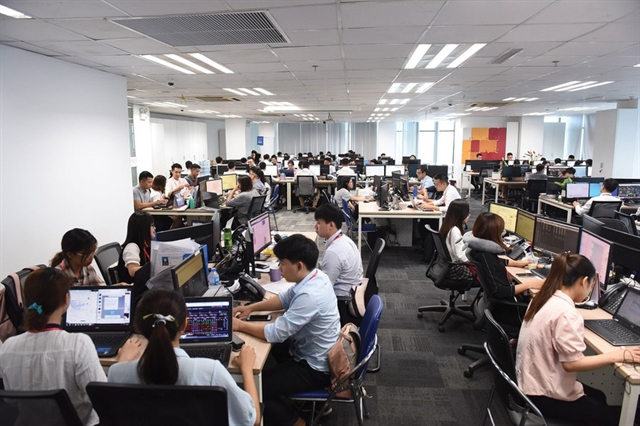Of the new 100,000 accounts, 31,900 were opened in March and 36,700 were opened in April.

The steep decline of the local stock market as the coronavirus ravaged economies lured many new punters to the market.
Retail brokers have reported a jump in new clients opening financial market trading accounts, with more than 100,000 accounts registered in the past three months.
Of the new 100,000 accounts, 31,900 were opened in March and 36,700 were opened in April.
The number of new accounts opened at HCM City Securities Company (HSC) in March, April and May nearly doubled over the same period last year.
At VNDIRECT Securities Company, there were 10,230 new accounts opened in May and 15,000 accounts in April.
Besides the new investors, there has been a considerable amount of money coming from officials and employees within enterprises, according to Tran Minh Hoang, Head of Research & Analysis Department under Vietcombank Securities Company (VCBS).
“Everyone has flocked to cash in on betting opportunities via a stock market plunge inflicted by damage caused by the coronavirus crisis,” Hoang said.
“They have accumulated beaten-down stocks in the recent massive sell-offs during the peak of the COVID-19 pandemic.
“The steep fall of the stock market in March attracted investors as 60 per cent of stocks on the market had market prices lower than their book values.
“Shares are proving too tempting for thousands of punters and this brings more people to wager, boosting both trading value and volume.
“This capital flow will stay in the stock market for the long-term if clients are professional or can demonstrate an understanding of the risks.
“However, most of the new cash flow poured into the market shows signs of speculation in the short term. Bettors will sell-off anytime they see risks. The stock market has rebounded sharply since April, making the index approach strong resistance zone. Many forecasts say the stock market may shake strongly in the short term as speculative cash flows are gradually withdrawn,” Hoang said.
Nguyen The Minh, Director of Analysis at Yuanta Vietnam Securities, said new cash flow had not shown signs of withdrawing from the market, especially as other investment channels are generally considered more tedious.
“Viet Nam gained initial success in containing the COVID-19 pandemic. GDP this year is forecast to maintain positive growth of 4 per cent.
“Investors also focus on information about the wave of foreign direct investment inflows into Viet Nam, public investment promotion process, opportunities from the newly-ratified Europe-Viet Nam Free Trade Agreement, equitisation and divestment of State capital,” Minh said.
Pham Thien Quang, Director of VNDIRECT’s Investment and Asset Management Services, said the surge in newly opened accounts was unprecedented.
“Traders often rush to the market when stock prices rise sharply as a result of a growing economy or large profit margins. This year, the majority joined the market even amidst high risk of recession,” Quang said.
In early May, the VN-Index reached 800 points, a strong resistance zone. But positive market sentiment helped the index maintain uptrend and overcome the thresholds of 830 points, 850 points and most recently 880 points, heading to the next threshold of 900 points.
Experts believe the changes of the index are not as important as betting opportunities for each different stock code. But if the index surpasses important landmarks, market sentiment will be strengthened.
“The earning results of businesses in the second quarter may continue to decline, but economic supportive policies, especially stimulus packages, have helped strengthen investor confidence and support the market.
“Any upside will need a period of correction. Although it has not happened yet investors need to stay calm and limit leverage. Investors should also pay attention to cash flow trends to adjust investment strategy when the situation changes,” Nguyen The Minh said. — VNS





